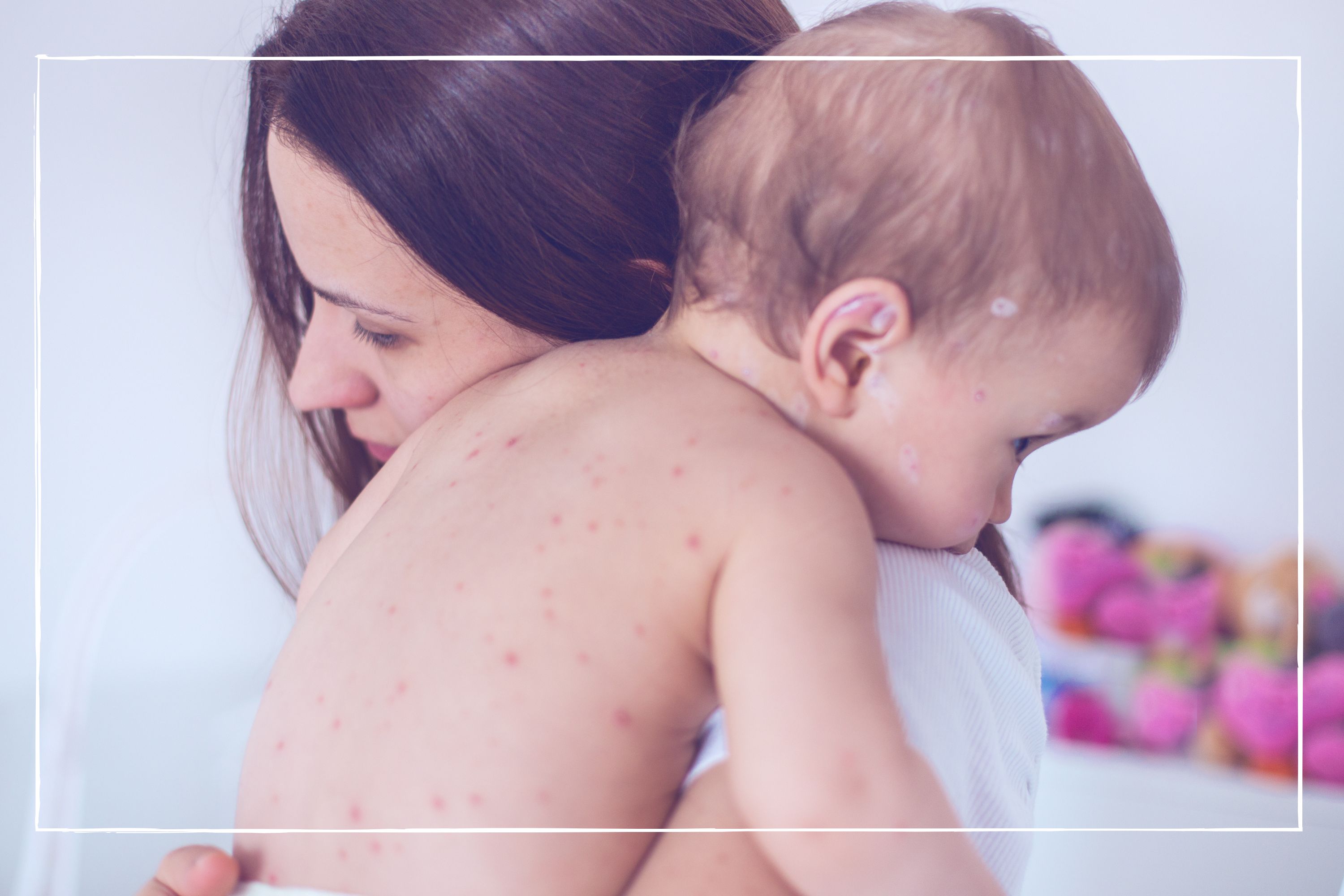So your child has chickenpox, what now? Advice on what to do, how to soothe symptoms and when your kid can return to school or daycare
Three GPs give their advice on what to do if your child gets chickenpox and share important precautions for people who are pregnant

Chickenpox is a very common illness in children and while it can cause little ones to be upset, uncomfortable and irritable, thankfully it usually eases and goes away on its own in one or two weeks, without any complications.
Many adults will be able to remember what it was like to have chickenpox as a child and might still have the scars on their body today. Decades after we were all kids, it’s still a really common and contagious disease among young children. Children under 10 are most likely to get the spotty, itchy rash and, according to the NHS, it can be particularly virulent between the months of March and May.
We consulted GP and founder of Say GP Dr Semiya Aziz (MRCGP), NHS GP Dr Hana Patel (FRCGP) and GP Dr Alexis Missick (MRCGP), to bring you advice on what to do if your child comes down with chickenpox and to answer all of your most commonly asked questions about the illness.
The information in this article is for general purposes only and does not take the place of medical advice. It is essential to be guided by your GP and take note of official NHS advice. You should immediately seek medical attention if symptoms worsen or you are concerned about your child. If you are unsure, concerned about their symptoms or a rash that has appeared, then it is crucial to seek personalised advice from a doctor as soon as possible.
What is chickenpox?
Chickenpox is a viral infection that is spread quickly and easily between children. It often starts with a fever a few days before the spots appear. Your little one will then have red, itchy spots all over their body, which turn into fluid-filled blisters. They will eventually scab over and fall off after a week or two. It's considered a mild condition, but anyone who's ever suffered it will know, the spots can be really irritating and your child is likely to feel uncomfortable.
Dr Patel says, "Chickenpox is very itchy and can make children feel miserable, even if they do not have many spots."
New spots can continue to appear for 3 to 5 days and your child may also have a temperature, loss of appetite and just be generally off colour for a few days. Your child may be particularly miserable if they have spots inside their mouth, eyelids or on their genitals.
Parenting advice, hot topics, best buys and family finance tips delivered straight to your inbox.
The spots will soon start to turn to fluid-filled blisters which can be really itchy and sore. These blisters will gradually start to go crusty and form a scab.
What to do if you child gets chickenpox
If you discover that your child has chickenpox, make sure to tell their school or nursery immediately. Newborn babies, pregnant women and people with a lowered immune system should not be exposed to the illness, so try to keep your child indoors and away from anyone at risk.
The NHS says chickenpox can spread to other people from 2 days before the spots appear until all of the spots have formed scabs. It may take up to 3 weeks after coming into contact with an infected person for spots to appear on your child’s body. So if your little one comes down with chickenpox, try to retrace your steps and let people you have come into contact with know, especially pregnant people, anyone with a newborn baby and anyone that has a weakened immune system.
Try not to let your child itch their spots as they’re at risk of scarring. Dr Missick also recommends cutting your child’s fingernails and putting socks on their hands at night to help stop them itching in their sleep.
Consult your GP if you have any questions about chickenpox or aren’t sure if your child definitely has it.
How to soothe chickenpox symptoms
Sadly, when it comes to chickenpox, it’s really just a case of sitting it out and waiting for the symptoms to ease. However, Dr Missick recommends, "using wet or cold compresses, bathing in cool water, or using oatmeal bath products" to help reduce the itching.
When you do bathe your child, Dr Patel advises that you should make sure to "pat your child’s skin dry" instead of rubbing, as rubbing can aggravate the blisters.
Your child may have problems sleeping and eating so make sure you let them get plenty of rest and give them plenty of fluids and soft food, especially if they have spots in their mouths. Cuddles and sofa time may be in order for a few days.
"Cooling creams or gels from the pharmacy can also help to soothe blisters," adds Dr Patel. Stephanie Lowe, GoodToKnow’s Family Editor, used PoxClin CoolMousse when her son had chickenpox and found that it helped. "PoxClin was a life saver when my three-year old got chickenpox," Stephanie says. "We'd been dabbing on calamine lotion which was taking forever and was sticky. This cooling mousse just smoothed on super easy. And as it didn't stain my son could 'help' me put it on too." Check with your pharmacist or doctor first about what creams or gels might be suitable for your child before purchasing.
Dr Patel recommends "Drinking plenty of fluid to avoid dehydration and taking paracetamol to help with pain and discomfort." One of the most important things to know about children who have chickenpox is that you do not give any aspirin or ibuprofen-based painkillers or medicines. The NHS says ibuprofen should not be used to ease the symptoms because it’s not safe for treatment of chickenpox.
Ways to soothe chickenpox at a glance:
- Wet or cold compresses
- Bathing in cool water and patting dry skin afterwards
- Using oatmeal bath products
- Plenty of rest
- Drink lots of fluids
- Cooling creams or gels from the pharmacy
Can I send my child to nursery or school if they have chickenpox?
The short answer to this is no. Chickenpox is very contagious, so it’s important your child reduces their contact with other people while they have the illness.
Chickenpox can be caught by simply being in the same room as someone with it. It is also passed on through coughs or sneezes and through direct contact with the blisters or by touching things that have fluid from the blisters on them.
Dr Patel states, "If children have chickenpox, they will need to stay away from school or nursery until all the spots have formed a scab. This is usually five days after the spots appeared."
How long is chickenpox contagious and when can a child return to school or daycare?
Someone with chickenpox can start spreading the illness one to two days before the first spots appear and then they will be contagious until all of their spots have scabbed over.
As chickenpox spots can appear at different times, and new spots can appear while others are becoming blisters or forming a scab, you will need to wait until the spots have stopped appearing and all of the spots have formed a scab before your child can return to school, nursery or daycare. This will be around 5 days after the last batch of new spots appeared, but of course, every case is different.
Nurseries and schools will have their own restrictions when it comes to chickenpox so it’s always worth checking with them after getting advice from your GP.
Should I take my child to the doctor?
Chickenpox usually gets better by itself without needing to see a GP.
However, while for most children chickenpox may mean a week off nursery or school, in very rare instances there can be complications such as bacterial infections or pneumonia. If you’re worried about your child then you should contact your GP immediately.
The NHS says you should get advice from your doctor or call NHS 111 if:
- Your child becomes dehydrated
- The skin around the blisters is hot, painful and red
- The symptoms get worse
- You're pregnant and have not had chickenpox before, or you're not sure, and you've been near someone with chickenpox
- You have a weakened immune system and have been near someone with chickenpox
- You think your newborn baby has chickenpox
As a parent, you know your child better than anyone and you should always trust your own judgement. If you are at all in doubt or have concerns about your child, you should contact your GP or call the NHS on 111. In a medical emergency, call 999.
Chickenpox and pregnancy
Chickenpox can be dangerous for people who are pregnant or have a weakened immune system. If you're pregnant or have given birth in the last week and think you might have been exposed to chickenpox, see your GP straight away and don't wait until spots have appeared to make an appointment.
Dr Aziz recommends keeping a child with chickenpox away from anyone who is pregnant because chickenpox "may pose a risk to the developing foetus" or make the baby very ill when it’s born. Dr Aziz says, "Chickenpox can result in congenital abnormalities such as defects of the limbs, eyes and organs. The neonate may also suffer complications during birth or after delivery if the mother develops chickenpox."
Dr Patel explains, "If you're pregnant and you haven't had chickenpox, or you're not sure if you have, avoid contact with anyone who has chickenpox or shingles. If you do come into close contact with someone who has chickenpox or shingles, get medical advice immediately."
She adds that, "A GP can do a blood test to check if you're immune to the chickenpox virus. If you are not, they may recommend antiviral medicine to reduce the risk of infection, and make the infection milder and not last as long."
Other precautions to take with chickenpox
Chickenpox can be very dangerous for newborn babies whose immune systems are still developing and also for children and adults with a weakened immune system.
Dr Aziz says chickenpox can also be dangerous for "individuals who have an impaired immune system, such as those undergoing chemotherapy or organ transplant recipients."
If your child has chickenpox make sure they do not go near newborn babies, or anyone who is pregnant or has a weakened immune system.
If you have a weakened immune system and have been near someone with chickenpox or you think your newborn baby has chickenpox, contact your GP immediately and seek urgent medical advice.
The NHS say, "Some people may be able to take medicine to prevent complications. It needs to be started within 24 hours of the spots appearing."
Can chickenpox be prevented?
As chickenpox is hugely contagious (around 90 per cent of people who've never had it will develop it if put in contact with the virus) it's very hard to prevent your child from contracting it. The easiest way to try and avoid your child getting chickenpox is to keep your children away from anyone who has it and is still in the contagious phase of the infection.
A chickenpox vaccine is also available but it’s not currently given as part of the UK’s national childhood vaccination programme. You can choose to get the vaccine privately, and it’s given as two doses, around 4 to 8 weeks apart and will cost around £60 per dose. The vaccine, which can be given to children aged one and over, is thought to be more than 90% effective and the UK’s Joint Committee on Vaccination and Immunisation (JCVI) has recommended that it’s added to the country’s vaccination schedule.
Professor Sir Andrew Pollard, chair of the JCVI, says, "We now have decades of evidence from the USA and other countries showing that introducing this programme is safe, effective and will have a really positive impact on the health of young children."
Answers to your frequently asked questions about chickenpox
How long does chickenpox last?
The NHS says a person will usually get better in 1-2 weeks. Dr Patel says it can take up to five days for the blisters to form scabs, which is also when symptoms may start to ease.
Will a sibling, who hasn't had chickenpox yet, definitely catch it too?
The situation will be completely different for different families. Dr Aziz says, "As chickenpox is highly contagious, there is a high risk that a sibling may catch chickenpox, but this may also depend on various factors. The immune status of the other sibling, maintaining good hygiene measures, isolation from the infected individual and avoidance of sharing utensils or items, which can all contribute to reducing the risk."
While it might cause something of a headache for parents having more than one child ill with chickenpox at the same time, they may also be keen to get it ticked off the childhood illness list in one go.
Can a sibling of a child with chickenpox go to school?
If a sibling of a child with chickenpox has already had chickenpox before and they are not showing any signs of being unwell, then there is no reason they cannot go to school as normal.
Dr Aziz says, "A sibling of a child with chickenpox may attend school, unless they appear to exhibit symptoms or have been diagnosed with chickenpox" then the sibling should stay at home and isolate as well.
However, it’s important to remember that chickenpox is highly contagious and Dr Missick says, "If the sibling hasn’t had chickenpox or the vaccine, it is very likely that they will catch it too, as the infection rate is very high. Because of this, it is advisable to follow the same rules in terms of how long they are likely to be infectious. However, this may be down to the parent or school’s discretion and whether they are showing symptoms. Following good hygiene and handwashing guidance is always advisable."
Can a parent of a child with chickenpox pass it on?
Dr Missick explains, "If a parent does not catch chickenpox and has had the virus before, or is vaccinated against it, it is unlikely that they could pass it on to other people. If a parent hasn't had chickenpox, they should stay at home as they could become infected and pass chickenpox on to others. It is also advisable to avoid people with reduced immune systems."
Can a child catch chickenpox twice?
Dr Patel says, "It's possible to get chickenpox more than once, but it's unusual."
Can grandparents look after a child with chickenpox?
This will really depend on how vulnerable the grandparents are and whether they have had chickenpox before.
Dr Missick says a grandparent can look after a child if they’ve had chickenpox before or have had the vaccine, as they are likely to be immune. However, Dr Aziz adds, "It's important to ensure that they are aware of the risks and take the necessary precautions, particularly if they are vulnerable."
Should you keep a child indoors with chickenpox?
"If your child has chickenpox, you should keep them at home and limit their contact with other people until all of the chickenpox blisters have formed scabs and no new blisters are appearing," Dr Missick says.
Obviously, if you are at home and the weather is nice there is no reason why your child can’t go into the garden for some fresh air if they feel well enough.
Is shingles the same as chickenpox?
Shingles is caused by the chickenpox virus and causes a different type of rash. You can catch chickenpox from someone with shingles, but not the other way around.
Dr Patel explains, "You can get chickenpox from someone with shingles if you have not had chickenpox before. When people get chickenpox, the virus stays in the body. It can be reactivated later and cause shingles if someone's immune system is weakened."
Shingles is an infection that causes a painful, red rash – normally on your chest or stomach, but it also can appear on your face, eyes or genitals. Other symptoms include just a general feeling of being unwell and a tingling or painful feeling in an area of skin. See the NHS website for more information about shingles.
Can you fly if your child has chickenpox?
Airlines have the right to deny boarding to passengers they suspect are unwell or contagious and this applies to chickenpox. Most airlines have a specific policy relating to chickenpox and will not allow passengers to board if they appear to have an active chickenpox infection. Check with your airline directly before travelling, but most airlines will not let you travel until at least six or seven days after the last spot has appeared and most will request a letter from a GP stating that the passenger in question is no longer infectious before allowing you on board.
The information on GoodTo.com does not constitute medical or other health advice or diagnosis and should not be used as such. Although GoodtoKnow consults a range of medical experts to create and fact-check content, this information is for general purposes only and does not take the place of medical advice. Always seek the guidance of a qualified health professional or seek urgent medical attention if needed.
Our experts

Dr. Semiya Aziz is a seasoned general practitioner with over 20 years of experience as a GP in both the NHS and in private practice. She first obtained her degree in microbiology from Queen Mary University of London, and subsequently, she obtained her MBBS from The Royal London Hospital. She is a member of the Royal College of General Practitioners and the British Society of Lifestyle Medicine. She is also registered with the Care Quality Commission (CQC) and the General Medical Council (GMC).

Dr Hana Patel is a versatile and experienced general practitioner in family medicine, and a life and mental health coach based in the Southeast London area. She first received her medical degree in 2005 from The University of London, and continued to further her medical qualifications through rigorous trainings and degrees. Dr Patel has trained with institutions such as King's College London, University of London, and University of Kent. In 2010, she received her qualification from The Royal College of General Practitioners (RCGP).

Alexis is an experienced General Practitioner (GP) having worked over 10 years in the NHS and 6 years internationally, mostly the Caribbean - namely Turks and Caicos where she is originally from. Alexis' approach in general practice is to holistically treat and empower patients via patient education, to share in their journey to better physical health. Alexis also works with UK Meds.

Kat has been a digital journalist for over 15 years after starting her career at Sky News where she covered everything from terror attacks to royal babies and celebrity deaths. She has been working freelance for the last five years and regularly contributes to UK publications including Stylist, ES Best, Woman&Home, Metro and more.
